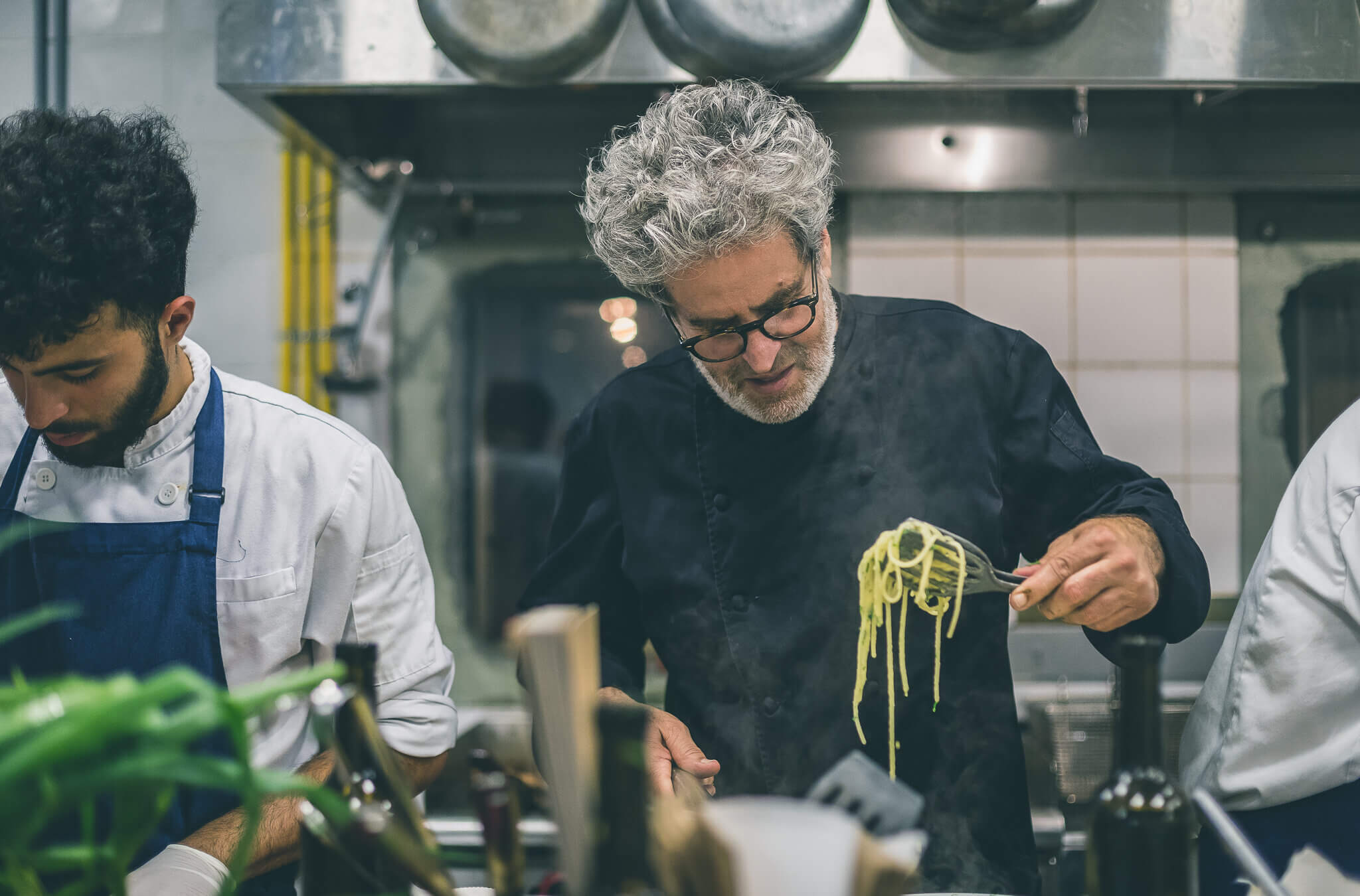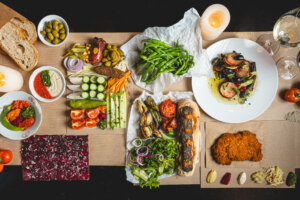Now in New York, a Michelin-starred chef’s new kosher restaurant straight from Tel Aviv
In the face of rising global antisemitism that has hit very close to home, Michelin-starred chef Eyal Shani brings Malka to the Upper West Side

Eyal Shani, who makes his home in northern Israel, is the proprietor of more than 40 restaurants. Photo by Ariel Efron
After the Oct. 7 Hamas terrorist attacks, the last thing Chef Eyal Shani wanted to do was to leave his home in northern Israel and fly to New York City. But Malka, his first-ever kosher certified restaurant outside Israel, was slated to open and he was committed to his crew. Once he got to Manhattan, he stayed all of 72 hours — long enough to put the finishing touches on the mostly plant-based vegan menu and train the staff.
“I couldn’t wait to leave and get home. You cannot imagine what the mood was like in Israel. We had lost so many people. Everyone felt hopeless and everything felt pointless. Cooking felt ridiculous,” Shani, 64, said in a Zoom interview from Israel on a recent, and rare, day off.
Once home, Shani, the proprietor of 41 restaurants, found himself living somewhat of a split-screen life. On the one hand, he was busy overseeing his 12 Israel-based restaurants. Each one had been repurposed into what he called “food factories,” providing upwards of 4,000 hot meals a day for soldiers before delivering them to the front. But he was also keeping close tabs on his new venture on New York’s Upper West Side. Because, while opening a new restaurant is a fairly ordinary thing in the world for the celebrity chef, the timing for this newest venture was anything but.
Since the start of the Israel-Hamas war, Israeli and Jewish owned restaurants have been facing a wave of boycotts and vandalism.
In late October, someone vandalized the 2nd Avenue Deli on the Upper East Side. Days before, that vandals struck the Pita Grill. Outside of New York City, a Florida bagel shop has been vandalized three times. A swastika was drawn on Canter’s Deli in Los Angeles. And in early November, pro-Palestinian protestors accused Goldie, a falafel restaurant in Philadelphia owned by Michael Solomonov, of participating in a genocide.
While in New York to open Malka, Shani zipped downtown to visit the chef at Shmoné, his Greenwich Village restaurant that earned him his first Michelin star. While he and the chef stepped outside to smoke a cigarette, Shani says, “An American couple, both in their 30s, walked by. She stopped to look in the windows, which were fogged a bit. He took her hand and says, ‘let’s leave this place; it belongs to Jewish people.’”
“I was shocked,” said Shani. “If he had said, ‘let’s leave, it belongs to Israelis,’ I could understand. But to immediately translate what is happening in Israel to Jews? That’s frightening to me.”
Meanwhile, in Paris, vandals spraypainted Magen David’s on his four restaurants. All of this led him to delay the planned opening of his restaurant HaSalon in London.
Inspired by his grandfather
Nevertheless, so far Malka has been bustling, serving up Grouper shawarma, charred beetroot carpaccio, Malka Schnitzel, chicken ramen and striped bass. The exposed brick walls lend a rustic touch as do the wooden tables and soft lighting.
“Having limits helps,” he said. “People think operating a kosher restaurant is dark and limiting, but I like the limits. It forces creativity. When you can order whatever ingredient you want from Amazon, that makes it hard.”
Shani’s grandfather, whom he describes as the first vegan, inspired Malka’s menu.
He lived above Shani’s childhood apartment in Jerusalem and took it upon himself to oversee Shani’s nutrition. To this day, Shani can recall the distinct hum of the blender as his grandfather prepared juices for him to drink.
He also recalled a time when he begged his grandfather for some cake. His grandfather gave in — after a fashion.

“My grandfather made this emulsion, which was very disgusting, and poured it on the floor of the apartment rooftop and let the sun cook it,” Shani said. “My first taste memory is how the stones of the roof influenced the bottom of the cake and how the sun rays influenced the top.”
While that cake recipe hasn’t yet made it onto Malka’s menu, the chicken dish inspired from his days serving on a missile ship in the Israeli Defense Forces has.
As Shani tells the story, he offered his services as a cook on board the ship after he was injured.
“I didn’t want to leave the service so I asked if I could cook. I told them I would do my best, but I had no skills. The first thing I invented was terrible. It was a chicken roasted with black coffee powder. It was like I had covered it with sand,” Shani said.
He served it for lunch. When he went upstairs, he saw several soldiers tossing the chicken “through the little round windows into the sea.” That dish has since become a classic aboard Israeli Navy ships.
Then, about three years ago, Shani was invited to cook on the same missile ship he once served. Naturally, he served the chicken dish.
“Only this time I used a beautiful espresso,” he said.
A place to be together
Shani, who appeared on six seasons of MasterChef Israel, didn’t attend culinary school.
The closest he came to formal training was working his way through Julia Child’s recipes; particularly her recipe for bouillabaisse.
Shani served the fish stew, reimagined with Israeli fish, when he opened his first restaurant, Ocean in Jerusalem. Critics loved it and word of mouth spread. Yet, instead of feeling elated, Shani felt overwhelmed and hightailed it to the nearby mountains where he began picking wildflowers.

“I wondered what to do with them. When I got back to the restaurant I poured olive oil on a plate, arranged the flowers on top and then served it with some focaccia I had made. I told everyone, ‘Maybe some of the wildflowers are poisonous. I don’t know if they are good to eat or not,’” Shani said.
They weren’t good.
“I got lots of phone calls the next day from customers with stomach aches,” he said.
In spite of that early upset, his unconventional approach seems to be working.
In 2011 he opened his first Israeli street food restaurant Miznon in Tel Aviv. His whole blanched and roasted cauliflower has since achieved a cult-like following and the restaurant now has locations in Melbourne, Paris, Las Vegas and New York.
In April 2019, he and Sachar Segal, his longtime business partner, opened HaSalon in Hell’s Kitchen and in 2023 they opened a second branch in Las Vegas.
Now, three months after the war began, Shani has since re-opened his Israel-based restaurants and has once again found some joy in cooking and serving.
“People need a place to forget for a few hours, to forget the troubles. They need a place to be together, to laugh together, to cry together,” he said.















